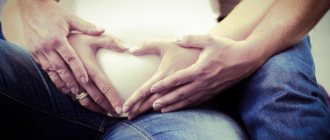17.07.2020 27517 0
The seventh week of pregnancy is almost the middle of the first trimester. At this time, the future systems of the child’s body are actively developing, so a woman should take special care of her condition. Registration, tests, ultrasound - for those who become mothers for the first time, all this looks like a completely new world. And there is no need to be afraid of it: the main thing is to understand what is happening and know what to expect.
Belly in the seventh week of pregnancy
At this stage, the fetus is still small, so pregnancy does not affect the size of the abdomen in any way. This is proven by numerous photos on the Internet. The tummy has not yet begun to grow, but the breasts may become enlarged: this is due to hormonal changes in the body and is completely normal. Some may note that buttoning your pants has become a little more difficult, but this is not due to the growth of the belly, but to bloating. The fact is that the hormone progesterone, which is actively released during pregnancy, affects the motility of the gastrointestinal tract and can provoke such symptoms. But if the expectant mother notices swelling, it is better to consult a doctor. At this time, they can be an alarming sign.
What's happening to the baby
The first trimester is characterized by incredible rates of fetal development. At the seventh obstetric week, the unborn child’s heart is already beating: by the end of the sixth week it already has two atria, and at the end of the seventh it becomes four-chambered. It is important to note that since the fetus develops very quickly, during this period it especially needs useful substances, so a pregnant woman’s diet should be varied, rich in vitamins and microelements.
Fetal development.
The organs and systems of the fetus, which are still in their infancy, at this stage of embryonic development begin to take on a formalized appearance. The brain is actively developing: the cerebellum and pituitary gland appear. The lymphatic and circulatory systems are improved, the placenta is formed: with its help, substances that enter the child from the mother’s body are filtered. Facial features begin to form, which will subsequently become clearer. At the same time, the child begins to develop as a boy or girl: the genitals are not yet formed, but there is already a tubercle on the body from which they will grow. The kidneys, lungs and bile ducts of the liver are formed, the spleen begins to work.
What can be seen on an ultrasound.
The seventh week is divided into obstetric and embryonic; these periods differ from each other by about 2 weeks. But the size of the fetus increases significantly over these 14 days. If at the 7th obstetric week it is no larger than a bean (up to 14 mm), then at the embryonic (ninth obstetric) week it is already approximately the size of a small plum (up to 30 mm). This can be seen during an ultrasound.
- The gender cannot yet be determined, but the fetus already looks like a little man who has limbs and a beating heart.
- The head at this stage is very large, much larger than everything else. This is due to the fact that in the seventh week the brain is actively developing.
How does a mother feel in the seventh week of pregnancy?
The first months of pregnancy are characterized by rapid changes in the emotional and physical state of a woman. The hormonal levels are still unstable, the expectant mother is not used to her position - it is better to remember this from the very beginning, not only for the pregnant woman herself, but also for her loved ones.
Toxicosis
. This is an unpleasant but common phenomenon: a woman may experience nausea, especially in the morning, and sometimes vomiting. However, toxicosis is not at all necessary. It is not known for certain what it is connected with, but some believe that the physical condition of the woman before pregnancy and heredity are important. Some manage to avoid it, but if you do have to face it, try to maintain a positive attitude. Within a few weeks the discomfort will stop. And in order not to overload the body, try to eat food that is easier to digest.
Increased fatigue.
A woman may feel weak and get tired quickly. This condition requires support from the pregnant woman’s loved ones. Perhaps things that a woman could handle easily before will now tire her greatly. However, it is also not worth stopping physical activity completely, unless recommended by a doctor: physical inactivity does not have the best effect on the condition.
Frequent urination.
The embryo develops in the uterus, so it increases in size every week and begins to put pressure on neighboring organs. Including the bladder. Therefore, a woman begins to feel the urge to go to the toilet much more often than usual, and she should be prepared for this.
Bloating and constipation.
Progesterone, a hormone that is released during pregnancy, affects the functioning of the gastrointestinal tract, so a pregnant woman may experience unpleasant sensations. This too passes; To relieve symptoms, you need to watch your diet. If bloating and constipation bother you too much, you should consult a doctor - he will tell you what to do.
Mood swings.
Due to hormonal changes in the body, in the seventh week (or a little earlier), a woman’s mood begins to change dramatically. Hormones are still unstable, the body is not accustomed to the new state, and therefore reacts to what is happening with such manifestations as aversion to smells, tearfulness, and emotional instability. It is important to try to keep a level head.
Abdominal cramps
. Many women in the early stages are faced with the fact that the lower abdomen begins to pull and unpleasant spastic sensations arise. They are usually caused by the growth of the uterus, intensify with physical activity, but generally remain not very intense. In such cases, the pregnant woman is recommended to sit down and rest a little. With rest, the spasms should subside. If the pain is severe and does not go away, you should immediately consult a doctor.
Breast tenderness.
The breasts swell, tingling and itching begin, and sometimes they begin to hurt if touched. This is due to hormonal preparation for feeding the unborn baby and is normal, but if the sensations are too intense, it is better to report them to the doctor.
Treatment
If tests show that the stomach was tight at 7 weeks of pregnancy due to natural physiological reasons, then, with a high probability, no medical procedures will be prescribed at all.
These pains will stop bothering you soon, and you won’t have to remember them
If the pain is very severe, the doctor will prescribe painkillers with paracetamol or ibuprofen, No-shpu. These are one of the few medications that pregnant women are allowed to take due to their safety for the life of the fetus.
If there is a threat of placental abruption and potential termination of pregnancy, a woman should reduce any physical activity to zero and observe strict bed rest. This way the fetus will have a chance to live. If there is a risk of miscarriage, the pregnant woman will be prescribed medications containing progesterone, and may need to take them until delivery. Diagnosing an ectopic or frozen pregnancy leaves no choice - only surgical intervention before a threat to the woman’s health arises. For surgical pathologies, a special course of treatment is prescribed, depending on the diagnosis.
Examinations in the seventh week of pregnancy
The seventh week and the first months in general are considered the most risky. During this period, the child is actively developing, and almost anything can affect his condition, so observation by a doctor is mandatory: thanks to him, alarming symptoms can be noticed in advance. It is in the seventh week that a woman registers as pregnant. The gynecologist conducts an examination, gives the pregnant woman recommendations for lifestyle changes, and refers her to other specialists. Among the studies that need to be completed:
- blood test for hCG, a hormone that can be used to determine pregnancy;
- gynecological examination;
- if necessary, for example if there is a suspicion of multiple pregnancy, ultrasound;
- ECG (cardiogram).
The gynecologist prescribes examination by specialized specialists: ophthalmologist, ENT specialist, dentist, surgeon, geneticist, endocrinologist. This is important because pregnancy affects all systems of the body, and you need to understand in advance what state they are in and whether the pregnant woman will need additional support.
Diagnostics
At 7-8 weeks of pregnancy, most expectant mothers register with the antenatal clinic. When visiting a doctor, a woman needs to be told about all the unpleasant symptoms that worry her. This will allow the doctor to get an overall picture of the course of the pregnancy.
The gynecologist will need additional laboratory and instrumental studies:
- general blood and urine analysis - to determine the level of hemoglobin, leukocytes, protein, and identify inflammatory processes in the body;
- Ultrasound – Ultrasound examination is absolutely safe and allowed at any stage in order to assess the condition of a woman’s internal organs and the degree of fetal development, eliminating the possibility of an ectopic and frozen pregnancy.
Having the examination results in hand, the doctor can determine the exact cause of the discomfort and prescribe the correct treatment.
Alarming symptoms
Some signs are abnormal and their occurrence is a reason to consult your doctor immediately. It is in the seventh week that deviations most often manifest themselves, so you should not ignore the symptoms - it is better to consult a doctor so as not to harm yourself and the child.
Bleeding.
Bleeding is abnormal and can accompany dangerous conditions: miscarriage, ectopic pregnancy. This can threaten the life of the mother herself. If it starts, you can’t delay getting medical help.
Increased body temperature.
It may also indicate a common ARVI, but during pregnancy even a cold affects the condition of the fetus. But if the temperature is not associated with a respiratory infection, this is a reason to immediately contact a doctor. This happens with a frozen or ectopic pregnancy. You should also consult a specialist if you have an infectious disease. Some of them (flu, rubella) can seriously affect the fetus, so even before pregnancy a woman is recommended to be vaccinated. “There are many infectious diseases, and all of them, as a rule, pose a danger to the unborn child. Each of them has a negative effect to a greater or lesser extent, depending on the duration of pregnancy and the mother’s immunity... That is why a preliminary, even before pregnancy, thorough medical examination of future parents is necessary,” says the Methodological Recommendations of the Moscow Department of Health for future parents “How to give birth to a healthy child” [1].
Nagging pain in the lower abdomen.
If the pain is mild and infrequent, this is considered normal and is caused by the growth of the uterus. But constant spasms and pain are a reason to worry. Perhaps the pregnant woman needs the help of a doctor.
Abdominal pulsation.
Pulsation, like most other symptoms, may indicate natural changes, or it may be a dangerous sign of a pathological condition. It is better to consult a doctor: he will tell you what to do depending on the situation. You should not self-medicate and look for advice on forums, because each woman is individual, as are the symptoms of her pregnancy.
Possible reasons
Various factors, and sometimes a combination of them, can provoke nagging pain in the lower abdomen at the 7th obstetric week of pregnancy.
Many processes occur in the body aimed at a large-scale restructuring of all vital systems, and any of them can result in unpleasant pain. Now let’s talk about the most likely reasons for such sensations.
Sprain
The first and main reason is stretching of the muscles and ligaments of the uterus and abdomen. At week 7, the fetus is growing dynamically, the uterus is becoming larger and larger, and it is already a bit cramped in the abdomen. That is why a large load falls on the abdominal ligaments. Uncomfortable sensations usually appear on the left or right. With any active movement, coughing, sneezing, they can worsen.
Risk of miscarriage
In the early stages, the likelihood of miscarriage is greatest. Most often this is due to uterine hypertonicity or placental abruption. The danger of miscarriage is indicated by vaginal discharge with blood clots, a rapid increase in temperature, the appearance of weakness and nausea, as well as atypical hardness of the abdomen.
Ectopic pregnancy
If the embryo does not enter the uterus, but remains on its wall or ovary, an ectopic pregnancy results.
Its obvious symptoms are:
- pain in the form of tremors, reminiscent of contractions;
- regular attacks of nausea;
- dizziness;
- Brown discharge with blood.
In this case, it hurts in one specific area. This means that the fertilized egg has attached itself somewhere there.
Frozen pregnancy
Another problem is the death of the fetus inside the placenta due to infectious infection or genetic failure. To all the symptoms characteristic of an ectopic pregnancy, there is added the feeling that there is no fetus inside at all: toxicosis recedes, the nipples become softer. Nagging pain appears in different parts of the lower abdomen.
Intestinal disorders
If the enlarged uterus puts pressure on some parts of the intestines, they, of course, will give a warning signal about this. Compression of the intestines is fraught with constipation, and they are extremely undesirable during the period of bearing a child. Other consequences are bloating and increased gas formation. How to deal with this? It is necessary to adjust or completely change the diet, eliminating from it all foods that may cause discomfort.
Gynecological diseases
Other bad reasons for stomach pain at 7 weeks of pregnancy are diseases of the reproductive system.
One of the most common is a cyst of the corpus luteum of the uterus.
Fortunately, it does not pose a threat to the life of the fetus and mother, does not require treatment and usually resolves itself soon.
It is worse if the examination reveals inflammation of the urinary tract. They have to be treated, otherwise the pain will gradually only get worse. The same applies to inflammation of the ovaries and cystitis.
Venereal diseases
A common source of aching, nagging pain is possible sexually transmitted diseases. Most often they develop after unprotected sexual intercourse and frequent changes of partners. Symptoms, in addition to pain, include itching and redness on the genitals and unpleasant-smelling discharge.
Surgical pathologies
It also happens that the true cause of discomfort in the lower abdomen is not related to pregnancy, and was in the body before. For example, with an inguinal hernia, the enlarged uterus will put pressure on this area, which will make it very difficult and unpleasant to make any movement, even a minor one.
Sharp, shooting pains on the right side of the lower abdomen may indicate appendicitis
Additional symptoms:
- gradual subsidence of pain after each lumbago and its spread across the entire width of the abdominal cavity;
- increased pain when pressing on the appendix area;
- elevated temperature;
- the appearance of dizziness;
- general weakness and loss of strength.
Other undesirable pathologies are inflammation of the kidneys, gall bladder, and, in particular, intestinal obstruction or simply constipation. Its surest sign is the inability to go “largely”, even with great need. If this disease is diagnosed, urgent surgical intervention is necessary. Otherwise, there is a serious threat to the health and life of the fetus and its mother.
Natural causes
Sometimes any worries are groundless because the lower abdomen swells due to natural changes in the body during pregnancy. Changes in hormonal levels, switching the main “attention” to ensuring the life of the fetus, attracting additional resources - all this can contribute to the appearance of pain.
If medical tests determine that the stomach is stretching for natural reasons, do not worry
Lifestyle of an expectant mother
Pregnancy requires a woman to pay increased attention to her condition. You need to monitor your well-being and try to avoid serious worries or stress.
Nutritional features.
According to “Nutrition during Pregnancy” by Dobrokhotova Yu.E. and Borovkova E.I. [2], in the first trimester, the calorie intake should remain at the same level. It will need to be increased in the second and third, when the child needs more nutrients and calories. It is important to keep a balanced diet, because the developing fetus needs nutrients in large quantities. The authors also advise increasing your fiber intake, but trying to eat less simple carbohydrates. Of course, smoking and alcohol are prohibited [1]: in the early stages, the mother’s addictions harm the fetus even more than in the later stages.
Taking vitamins.
WHO recommendations for providing prenatal care for a positive pregnancy experience [3] contain complete tables indicating the amount and type of vitamins and supplements that a pregnant woman should take. The exact set is individual (you need to consult your doctor), but some recommendations are relevant for everyone. It is recommended to start taking folic acid even before conception.
Sex life.
Your ability to have sex during pregnancy depends on your circumstances. If there are threats, uterine tone and other alarming conditions, the doctor usually recommends stopping sexual activity until the threat subsides. During a healthy pregnancy, sex is possible if the physical condition of the pregnant woman allows it.
Recommendations and advice for expectant mothers
- Sexual activity can continue if there is no threat of miscarriage.
- Get more rest and walk in the fresh air. However, refrain from heavy physical activity.
- Pay attention to your breasts - you should start using special products that will help keep them soft and prevent them from stretching.
- Self-medication is contraindicated. Treat any ailments only after consultation with a gynecologist.
- Give up alcohol and cigarettes.
- Contact less with household chemicals.
Pregnancy is an amazing stage in the life of every beautiful lady. Drawing conclusions, after all that has been written, the most important thing for a woman is to pay attention to herself, experience only positive emotions, not overload her body, eat right and enjoy her condition.










